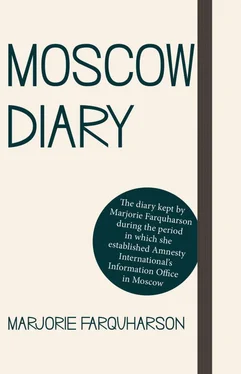Marjorie Farquharson
MOSCOW DIARY
“A good traveller has no fixed plans, and is not intent on arriving.”
Laozi
THE FIRST EIGHT WEEKS: JANUARY–MARCH 1991
Thursday 24 January
While our wheels are being changed at Brest-Litovsk I’ll take advantage of the pause to write this diary.
My visa came through after four days’ delay. The Moscow Foreign Ministry said, “Strange things are happening, particularly in the London Consulate. This is not the first time…” The official at the USSR Embassy asked me to come and collect it at the “KGB centre, 18 Kensington Palace Gardens”. This was either a slip of the tongue or refreshing candour on his part.
It has been a very interesting ride so far. The Belgian ticket collector said, “Moscow? Give my greetings to Gorbachev”, and the carriage laughed. Later, while I was killing six hours at Köln station, next to a fruit machine that played ‘Ode to Joy’, a Pole sitting with me said, “Gorbachev?” and made a fifty-fifty motion with his hand. The last person to comment was a West African in my sleeper, who said, “Give Gorbachev my best wishes”, before pulling the blanket over his head.
I woke up in Poland, where I have spent the last twelve hours. It looked sodden. In 1975 I remember it looked the poorest country we travelled through. I still saw some old steam engines, and a man with his horse at a well, but the station buildings were newly painted and the fields looked neat. There were also some new cars on the road. The Poles I travelled with were remarkably quiet: not eating, not speaking, just reading and saying “goodbye” nicely when they got off. Vivid contrast to three immensely physical Russians who got on after Poznan and had us all shifting our things etc.
Changed trains at Warsaw to catch the train I should have got at Oostende. It was an immense battle for me and every other passenger to be allowed on, even though we had our tickets and reservations etc. I somehow wasn’t prepared for Soviet bureaucracy to start on Platform 4, Warsaw station. Once I was on the steward became very pleasant and amusing. He was reading Moscow News .
Friday 25 January
When I woke up we were travelling through rural Belorussia. There were trees pressing at the window, blue sky, snow on the ground, and every so often we’d pass a village. This is a fantastic way to travel and a fantastic way to arrive.
It was -7 degrees in Moscow and I was met by my landlord and his wife, she in an expensive black fur coat. In the cab home they were discussing how the 50- and 100-rouble notes had been withdrawn from circulation almost overnight. Apparently it was meant somehow to hit black marketeers, but it also wiped out pensioners’ savings at a stroke. The landlord’s wife was anxious to divest me of all the things I’d brought them as rent. When I told her I’d sent them ahead of me she wanted me to ring the shipping company there and then. As she was going through the list of things, she saw my jacket and said, “I wanted one like that”, looked again, then said, “Oh, no, it’s cheap”.
The landlord seemed to have a change of heart later on – brought me some bedding, food and an iron. He told me there are rumours that the 10- and 25-rouble notes will also disappear. I put on the radio and heard Galina Starovoytova’s familiar voice. She said it was hard to imagine anyone further to the right than the President, or who could hold a gun to his head and say, “OK, it’s your life, or tanks in Lithuania.”
Saturday 26 January
Today they announced there would be joint army and police patrols in major cities at night, public holidays and possibly weekends. The KGB also got new powers to investigate economic crimes.
There were snowstorms all day. I caught up on my Izvestiya subscription. They have called this year, “The Year of the Market”, and are carrying a rags-to-riches story on the front page. I came to like their foreign news coverage – particularly of the Gulf, which they see as a political issue rather than a military one. Radio Moscow announced major price rises in Georgia and said it was price rises like these that had “led to the disturbances in the Baltic”. I wonder if Georgia’s the next to get it in the neck.
Bloody hours of football on the World Service as I cleaned the bathroom.
Sunday 27 January
I thought I was being woken by someone’s ornamental clock in the morning, but realised it was church bells, presumably ringing from the church down the road. It was returned to believers a couple of years ago and has since been restored. Church bells were illegal until 1988.
It was a beautiful day: blue sky, deep frost and -16 degrees. It was so cold my face hurt by the time I turned out of the courtyard into the street. Went to visit Yelena’s mother and give her photos of their wedding party in October. She took such pleasure in looking at them it gave me pleasure just to watch her. She said the first frost always comes around the Feast of the Baptism, which has just passed. Apparently believers take a container to church to receive water that has been blessed. Yelena was arrested at the beginning of the Feast of the Baptism in 1984 and so her mother never got her container to church that year.
There is something very clean and peaceful about their flat. I stayed about three hours and she told me some interesting things about old Moscow. She insisted on giving me sheets, a blanket, pans, plates and cutlery, her own grapefruit jam and some mayonnaise someone had given her from Tomsk. A lovely person.
The cold was exhausting so I didn’t go out again in the evening. Alksnis of the “Soyuz” faction in Parliament was threatening there will be civil war in the Baltics which will spread through the USSR. He blamed Gorbachev for not going the whole way and imposing presidential rule. The radio is now denying rumours that 25-rouble notes will be withdrawn. However, a number of shops are not taking them.
Monday 28 January
I’ve spent the whole day tied to the house, waiting for my advance luggage to arrive. I phoned them at 9.00am. A nice guy came to pick up papers at 2.00pm and it’s now 6.00pm. I’ve been reading Dennis Healey’s autobiography; he said when he addressed the City at the Mansion House, his wife had to sit upstairs in the gallery “like a medieval leper, listening to a sermon from his squint”.
Tuesday 29 January
Because it was snowing I could see a path people take, off the beaten track. It turned out to be a shortcut to the metro and takes you through a lovely glade in front of the church. There’s also a fruit and veg shop hidden away there.
This morning I went to the local sorting office to open a PO box for Amnesty mail. Two women who were sifting mail in a dilatory sort of way ignored me for 4–5 minutes, then I eventually got to speak to the chief postmistress. She said she would contact me when a box came free and asked me to jot down my details. I deliberately said that I was on a visit sponsored by the Foreign Ministry, and suddenly she brought me all the forms and a key, and even got a towel to dust the box (!). To give her her due, she had been very civil before I mentioned the Foreign Ministry. The box cost 48 roubles (£4.80) for the year.
Had a very interesting lunch with Valentina, who also sent me away with sheets and pillowcases. She said she had been non-political all her life until the first real elections in 1989, when she went to a ward meeting to nominate twenty-three candidates and noticed the list was rigged. She stood up and pointed it out, and got nominated herself. In her nomination speech she had said she was for Sakharov, Yeltsin, Afanasyev – and added in English because she couldn’t think of the Russian, “for human rights too”. That and the demonstration on 25 February last year were two of the biggest events of her life. The third was when Sakharov was howled down in Parliament for his comments on Afghanistan. Valentina doesn’t like foreign radio stations because they sound condescending and she got tired of people foisting their views on her in Britain. Cautionary advice to me.
Читать дальше












